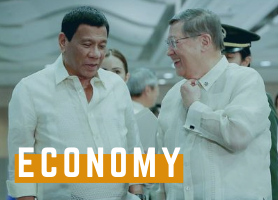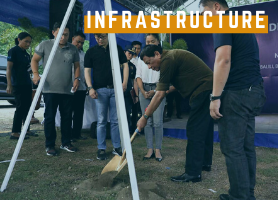The government’s economic team is calling on Congress to immediately pass the remaining packages under the Comprehensive Tax Reform Program (CTRP) along with other economic stimulus measures to help revive the economy reeling from the effects of the coronavirus disease 2019 (COVID-19) pandemic.
Finance Secretary Carlos Dominguez reiterated this call during a pre-State of the Nation Address (SONA) forum on July 8, where he presented economic indicators, such as Gross Domestic Product (GDP), unemployment and inflation rates, mirroring the heavy impact of the pandemic on the people and multiple industries. He said the government will borrow more money as it already spent P375 billion on COVID-19 response alone.
Dominguez reported that GDP growth sank to -0.2 percent in the first quarter of 2020 from 6.7 percent in the last quarter of 2019, while the unemployment rate skyrocketed to 17.7 percent in April from 5.3 percent in January. However, he said the inflation rate “further slowed down” from 2.9 percent in January to 2.5 percent in June.
These figures reflect the worsening coronavirus health crisis in the country as the number of infected persons surged to over 74,000 as of July 23. Several businesses have temporarily or primarily shut down due to unsustainable revenues, while over 7 million Filipinos have lost their jobs. Balancing public health and economic concerns, the government has kept the economy partially closed while community quarantines and minimum safety standards are strictly implemented.
Among the four pending tax reform measures, the Corporate Recovery and Tax Incentives for Enterprises Act (CREATE) bill, the revised version of the tax reform package 2 certified as urgent by Duterte for Congress’ approval, is touted as the “largest stimulus package” ever in the country for enterprises, particularly the micro, small, and medium enterprises (MSMEs), to keep them afloat. The Department of Finance (DOF) proposes a 5-percent cut in the current 30 percent corporate income tax rate which companies can use to continue operating and retain employees.
But Dominguez maintained the “best” program to revive the economy is through infrastructure projects under the Build, Build, Build (BBB) program due to their “high multiplier effect, stimulating demand and generating new jobs and businesses.”
With only two years left in his term, most of the president’s promises for economic reforms have yet to be fulfilled.
In 2019, Duterte renewed his call to Congress to pass the remaining tax packages, specifically the Tax Reform for Attracting Better and High-quality Opportunities (TRABAHO) measure, one of the predecessor bills of CREATE.
The President has not fulfilled his campaign promise to coconut farmers to return the taxes imposed on them during martial law through the creation of a trust fund. But he was able to deliver on his promise to repeal the quantitative restrictions or quota system on rice importation and changed it with tariffication.
VERA Files Fact Check tracks the economic promises Duterte made in his previous SONAs:
PROMISE: Pass the remaining Tax Reform packages |
|
“I therefore implore Congress to immediately pass Package 2 of the Comprehensive Tax Reform Program, or the TRABAHO Bil.” (SONA 2019) “I am also asking Congress to pass the remaining packages of my Administration’s Tax Reform Program, and the bills that would further raise excise taxes on — very good, let us do it — tobacco and alcohol.” (SONA 2019) |
|
CREATE, the second of eight tax reform packages of Duterte, is still pending in Congress. CREATE primarily seeks to cut corporate income taxes by 5 percent starting July and modernize fiscal incentives for businesses to attract investments in the country. CREATE, formerly called the TRABAHO bill and then changed again into Corporate Income Tax and Incentives Rationalization Act (CITIRA), is still pending in the committee level of the Senate. The House of Representatives (HoR) was first to approve the bill in the third and final reading in September 2019. In a July 16 press release, Sotto said CREATE is among the economic stimulus bills the Senate may pass in the remaining two years of Duterte. DOF said CREATE is the “recalibrated” version of CITIRA that will serve as the “largest stimulus program” for companies in the country, particularly the micro, small and medium enterprises (MSMEs), impacted by the COVID-19 pandemic. It said the 5-percent cut in the 30 percent corporate income tax can be used by companies to fund their operations and retain employees. Other tax reform packages seeking to legislate one fiscal regime for mining taxes, reform of the real property valuation system, and simplification of passive income and financial intermediary taxes are also pending in Congress. Duterte had already signed into law four of his tax packages. These include the Tax Reform for Acceleration and Inclusion (TRAIN) Law, increase of sin taxes on tobacco and e-cigarettes, tax amnesty, and revamp in the collection and rates of motor vehicle user’s charge (MVUC). |
PROMISE: Encourage investments in rural and mega urban areas and Metro Manila for sustainable and equitable economic development
|
|
“We will encourage investments that would develop the rural areas and Metro Manila and other mega urban areas.” (SONA 2019) |
|
Data from the Philippine Statistics Authority show that foreign and local investments in several regions, such as Central Luzon (Region 3) and CALABARZON (Region 4-A), have increased in 2019. Among the 17 regions, CALABARZON received the highest share of total investments with P437.2 billion, or 91.4 percent higher compared to 2018, comprising 33.4 percent of the P1.3 trillion total approved investments in the country in 2019. Although its annual total investments were slashed by 44.1 percent, Central Luzon came in second with P120.7 billion. The National Capital Region ranked third with P66.095 billion (but with a 64.9-percent decrease). The Cordillera Administrative Region had the highest increase in investments by over 3,000 percent increase at P33.479 billion (compared to P990 million in 2018). Meanwhile, CARAGA (Region 13) and Northern Mindanao (Region 10) relatively lagged behind other regions after their investments shrunk by 94.6 percent and 93.1 percent, respectively. According to PSA’s Foreign Investments Report for 2019, a bulk or 39.6 percent of the total approved investments in 2019 are intended to finance projects, mostly telecommunication projects with nationwide rollouts, that “would be spread across different regions” in the country. PSA, however, noted that not all investments will “materialize during the period.” It said “there is a gestation period between approval and actual investments.” Meanwhile, the Philippine Economic Zone Authority (PEZA), one of the investment promotion agencies of the government, said there are now 73 new economic zones, such as 52 information technology centers and one agro-industrial economic zone, in the countryside amounting to P88.3 billion in total investments from October 2016 to June 2020. PEZA said the companies in all of its 408 economic zones directly and indirectly employed 6.5 million Filipinos as of May. |
PROMISE: Enforce the Rice Tariffication Law for farmers
|
|
“We shall ensure the full implementation of the Rice Tariffication Law, including the Rice Competitiveness Enhancement Fund.” (SONA 2019) |
|
The government continues to implement the Rice Tariffication Law or Republic Act No. 11203, enacted in February 2019, which replaced quantitative restrictions or quotas on rice imports entering the country with a minimum of 35 percent tariff per import. Dominguez, a former Agriculture secretary, said the law will “revolutionize” the agriculture sector and “slash” the rice retail cost, while incumbent Agriculture Secretary William Dar said it will help the country “to fully achieve rice sufficiency.” In a report in March, Trade Secretary Ramon Lopez attributed the record-low prices of rice during the first three weeks of February to RA 11203. Citing data from PSA, Lopez said the retail price of regular milled rice at P36.18 per kilogram was the lowest since December 2013, while the well-milled rice at P41.19 per kilogram was the lowest since May 2016. He did not specify if the prices pertained to local or imported grains. The collection of tariffs on rice imports is also continuous. According to the Bureau of Customs (BOC), the total collected tariff from January to May this year has reached P7.955 billion. In 2019, DOF said the total revenue from private rice imports was P12.3 billion. Under RA 11203, an annual P10-billion fund from the rice tariff collection must be appropriated to the Rice Competitiveness Enhancement Fund (RCEF) in six years or until 2024 to benefit farmers, farm workers and their dependents. The excess tariffs will be used for other projects that will benefit rice farmers, such as titling of rice lands. RCEF is distributed to different government agencies designated to provide machinery (P5 billion), seeds (P3 billion), credit assistance (P 1 billion) and extension services (P1 billion), such as skills training, for rice farmers. Latest figures from Dar, as of July 22, indicate that nearly P3-billion-worth of subsidies have been given to 591,246 rice farmers affected by the rice tariffication law. Meanwhile, at least 2.125 million bags of inbred seeds have been distributed in 55 provinces as of June 21. As of June 21, the Philippine Center for Postharvest Development and Mechanization (PHilMech) has distributed 91 four-wheel drive tractors, 31 rice combine harvesters and 10 riding-type mechanical rice transplanters to 98 farmers’ cooperatives and associations in six provinces in Region III (Nueva Ecija, Bulacan, Pampanga, Tarlac, Aurora and Bataan). PHilmech continues to distribute and procure new rice farming equipment. Rice extension services, such as farm schools and distribution of information campaign materials, are also continuous despite the pandemic, Agricultural Training Institute (ATI) Assistant Director Rosana Mula said on July 14. |
PROMISE: Pass an enhanced version of Coconut Farmers’ Trust Fund bill
|
|
“I once again urge both Houses of Congress to pass a more responsive version of the bill establishing the Coconut Farmers’ Trust Fund to ensure the accelerated utilization of coco levy funds for the well-being and empowerment of the coconut farmers.” (SONA 2019) “Our farmers, especially our coconut farmers, form a significant part of the basic sectors of society. It is from the toil of their hands that we put food on the table. It is my hope that we finally see this through. I urge you, Congress, to convene the [bicameral] conference committee and pass at the soonest possible time the bill establishing the Coconut Farmers’ Trust Fund. I pray that you will do it.” (SONA 2018) |
|
Duterte again asked Congress to pass a measure that will establish a trust fund for the tax levies forcibly collected from coconut farmers during martial law after having vetoed two related legislative measures in February 2019. (See VERA FILES FACT SHEET: Three things you should know about a presidential veto) Currently, all new bills seeking to create a Coconut Farmers and Industry Trust Fund remain pending in both houses of Congress. In the Senate, at least four bills already consolidated in a committee report are pending in second reading with special order status since May 27. At least 17 bills filed in the HoR are still being deliberated by a technical working group for consolidation since November 2019. During his 2019 SONA, Duterte suggested to use just P5 billion of the P100 billion coconut funds for the farmers, deposit the balance and “let it remain as a remembrance to the people.” But a 2012 decision by the Supreme Court ruled the funds must be used only for the benefit of coconut farmers and improvement of the coconut industry. (See Duterte piqued by corruption, calling it national shame in SONA) The coconut levy funds came from taxes imposed on coconut farmers during the martial law era of former President Ferdinand Marcos Sr. The funds were supposed to benefit farmers and the coconut industry but ended up in the hands of the late dictator and his cronies who used them to acquire and expand their own businesses. The return of the coco levy funds to farmers was among Duterte’s campaign promises. He vowed to return their money within his first 100 days in office |
Sources
Department of Finance, REGAINING MOMENTUM, ACCELERATING RECOVERY IN A POST-COVID-19 WORLD, Accessed July 20, 2020
Department of Finance, Comprehensive Tax Reform Program, Accessed July 20, 2020
PTV, PANOORIN: Tatak Ng Pagbabago Economic Development and Infrastructure Clusters, July 8, 2020
Philippine Statistics Authority, Employment Situation in April 2020, June 5, 2020
Department of Labor and Employment, Statement of Secretary Silvestre H. Bello III on the April Labor Force Survey, June 5, 2020
Businesses temporary or permanently closing
- Manila Bulletin, Closure of 26% of PH businesses alarms DTI, July 16 , 2020
- Philippine News Agency, 26% of businesses closed operations in June: DTI survey, July 16, 2020
- DTI survey: 26% of businesses closed operations in June, July 18, 2020
Department of Health, LOOK: DOH COVID-19 CASE BULLETIN #131, July 23, 2020
Department of Finance, Package 2: Corporate Recovery and Tax Incentives for Enterprises Act (CREATE) , Accessed July 20, 2020
On comprehensive tax reform program
- RTVMalacanang, State of the Nation Address (SONA) 2019 (Speech) 7/22/2019, July 22, 2019
- Department of Finance, Packages of the Comprehensive Tax Reform Program (CTRP)
- TRABAHO renamed into CITIRA
- Rappler.com, 2nd tax reform package renamed Citira, hurdles 2nd reading in House, Sept. 9, 2019
- Business World, CREATE: Tax reform response to COVID-19, June 21, 2020
- Inquirer..net, Leap of faith on Citira bill, Sept. 17, 2019
On more investments in rural and mega urban areas
- RTVMalacanang, State of the Nation Address (SONA) 2019 (Speech) 7/22/2019, July 22, 2019
- Philippine Statistics Authority, Fourth Quarter 2019, Feb. 20, 2020
- Philippine Economic Zone Authority, PEZA’s different types of economic zones to become economic drivers in PH regional and countryside growth, June 10, 2020
On the rice tariffication law
- RTVMalacanang, State of the Nation Address (SONA) 2019 (Speech) 7/22/2019, July 22, 2019
- Official Gazette, Republic Act 1120
- Department of Finance, Dominguez says liberalized rice trade to stay as Gov’t steps up measures vs hoarding, smuggling, Nov. 13, 2019
- Department of Agriculture, Rice Competitiveness Enhancement Fund, Accessed July 20, 2020
- Department of Trade and Industry, Rice Tariffication Law led to record-low prices in 7 years, March 6, 2020
- Bureau of Customs, BOC Clarifies Data on Imported Rice Tariff Collection, June 11, 2020
- Department of Finance, Import tax collection from rice traders this year reach P1.71-B as of Feb. 14, Feb. 24, 2020
- Department of Finance, Rice tariffication a gamechanger in 2019, Oct. 1, 2020
- Land Bank of the Philippines, LANDBANK releases P3.02B in loans to help farmers and fishers boost productivity, July 14, 2020
- PTV, Tatak ng Pagbabago;The Pre-SONA forum (July 22, 2020), July 22, 2020
- Philippine Rice Research Institute, RCEF seed deliveries reach 2M mark; farmers laud program.July 1, 2020
- Philippine Center for Postharvest Development and Mechanization ,RCEF Mechanization Program Update, June 21, 2020
- Agricultural Training Institute, DA, ATI Bring RCEF Extension Updates in Virtual Presser, July 17, 2020
On Coconut Farmers’ Trust Fund
- RTVMalacanang, State of the Nation Address (SONA) 2019 (Speech) 7/22/2019, July 22, 2019
- RTVMalacanang, State of the Nation Address 2018, July 23, 2018
- Senate of the Philippines, Committee Report No. 65 (18th Congress), Accessed July 20, 2020
- Senate of the Philippines, Senate Bill No. 1396 (18th Congress), Accessed July 20, 2020
- House of Representatives, TWG consolidates bills on creation of coco levy trust fund, Nov. 5, 2019
- PTV, READ: Pres. #Duterte’s veto message on the bill strengthening the Philippine Coconut Authority | via Daniel Manalastas, Feb. 11, 2019
- PTV, READ | Veto message about enrolled bill Senate Bill No. 1233 / House Bill No. 5745 entitled: An act creating the coconut farmers and industry trust fund, providing for its management and utilization, and for other purposes., Feb. 18, 2019
- Supreme Court of the Philippines, G.R. Nos. 177857-58
- Duterte promised to return the coco levy fund
- CNN Philippines, Duterte promises farmers: I will return coco levy fund, March 30, 2016
- Rappler.com, Duterte, Cayetano vow ‘return’ of coco levy fund in 1st 100 days, March 31, 2016
- Inquirer.net, Coco farmers ask Duterte to fulfill his promise, Nov. 7, 2016
(Guided by the code of principles of the International Fact-Checking Network at Poynter, VERA Files tracks the false claims, flip-flops, misleading statements of public officials and figures, and debunks them with factual evidence. Find out more about this initiative and our methodology.)






